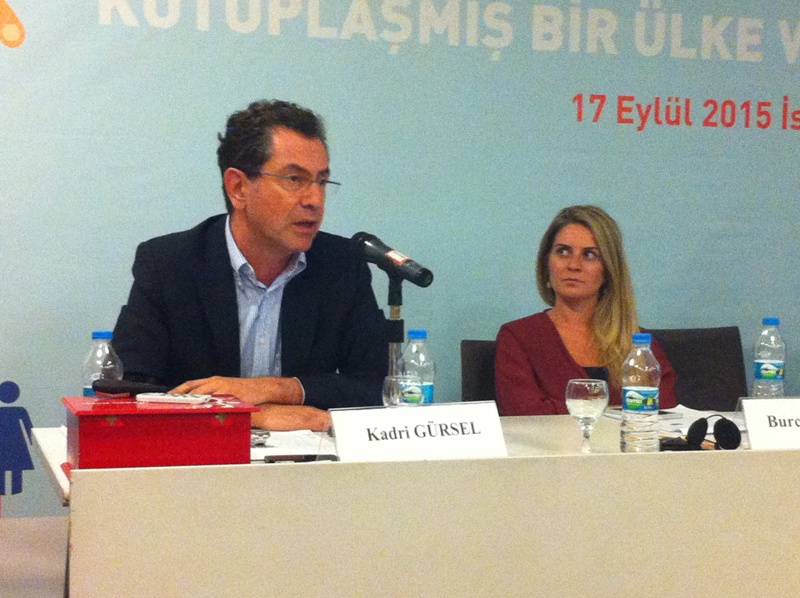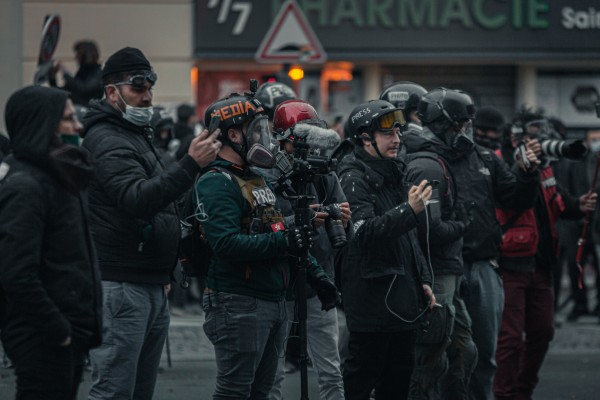Journalism in Turkey is “agonizing under unbearable pressure”, leading Turkish journalist and Chair of the International Press Institute (IPI)’s Turkish National Committee Kadri Gürsel said on Monday in an address to participants gathered in Warsaw for Europe’s largest annual human rights conference.
Gürsel made the remarks during a session chaired by OSCE Representative on Freedom of the Media Dunja Mijatovic as part of an annual two-week conference analyzing the OSCE’s 57 participating states’ implementation of core values promoting respect for human rights and fundamental freedoms.
Drawing attention to the myriad blows that press freedom has suffered in recent weeks in Turkey, where a repeat parliamentary election that likely will decide the future of President Recep Tayyip Erdoğan’s designs to create an all-powerful presidency is set for Nov. 1, the veteran journalist and former daily Milliyet columnist said that authorities are “criminalizing journalism” in the country.
“One thing is almost certain,” he warned. “If the repression is not stopped, journalism will not survive in Turkey. Freedom of expression and pluralism will also be lost altogether….”
The full text of Gürsel’s remarks appear below.
Honorable participants and representatives,
I’m here with the purpose of getting your attention to the rapidly worsening oppression against journalists and the aggravating suppression of media freedom in Turkey in between June 7 elections and November 1st snap elections.
Multiplying practices to silence and intimidate the independent media and critical journalists have become an obvious tactic of the political power to win November the 1st elections.
Attacks against journalists and journalism have surged to unprecedented alarming dimensions, particularly since the beginning of September.
Mainstream media is at the top of the target list. Authorities attempt to justify their attacks by abusing anti defamation and anti terrorism laws.
During these last weeks, Hürriyet daily has been raided twice in two days interval by mobs close to power. In the first raid the mob were led by an AKP parliamentary member.
Prosecutors have launched a terrorism propaganda investigation into the Doğan Medya Group, owner of Hürriyet.
Police raided and searched the offices of Bugün daily and Bugün TV belonging to Koza İpek group close to Gülen Movement, for allegedly financing terrorism.
Police also raided Nokta weekly magazine and confiscated freshly printed copies of the new issue before its distribution, for allegedly insulting President Erdoğan on its cover story.
Access to several Kurdish websites and news websites critical of government was blocked.
Several foreign media members were arrested in the southeast and then deported. Covering the Southeast, currently the theatre of a new conflict between the government forces and the PKK is dramatically restricted.
Media bosses vulnerable to government for many reasons have fired many critical journalists, including me. I’ve been fired from Milliyet last July for a tweet critical of Erdoğan’s Syria policy.
Intimidation and harassment of critical journalists have reached new heights: Now a columnist of one of the pro-AKP dailies repeatedly threatens journalists with death and can get away with it.
The number of journalists against whom cases are filed for insulting President Erdoğan is growing on almost daily basis.
Ladies and gentlemen, Authorities are criminalizing journalism in Turkey. Journalism is agonizing under unbearable pressure. My profession is one of the victims of politically engineered polarization.
One thing is almost certain: If the repression is not stopped, Journalism will not survive in Turkey. Freedom of expression and pluralism will also be lost altogether with journalism.
Without a free press it’s hard to call Turkey a democracy. Because without a free press, elections can’t be fair; without fair elections Turkey’s regime can’t fit into the narrow definition of democracy.
Thank you for your attention.



